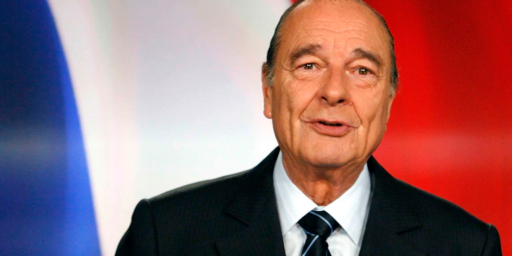CHIRAC BAN LARGELY FAVORED
That was the headline on the front page; I prefered it to the longer one inside, “French Muslims Offer Little Opposition to Head Scarf Ban .” Still, this is a fascinating story:
At a Tunisian bakery in a heavily Muslim neighborhood on the north side of Paris, a middle-aged woman with her head covered in an immaculate white head scarf shrugged off the news that President Jacques Chirac wants a new law banning Muslim head scarves from public schools. “It’s normal,” she said. “School should be a place of equality.”
The reaction was the same from the Algerian vendor at the local kebab shop. “Everything has its place,” he said. “Religion is private and should stay at home.”
Some local Muslims, already feeling singled out in France, were reluctant to speak openly about the proposed law, and most did not want to be named. “It’s only for high schools — it doesn’t apply to universities,” said a young woman wearing a veil and holding a briefcase, waiting for her train after attending classes at a Paris university.
But outside Paris’s main mosque, in a tranquil neighborhood of the Latin Quarter, unsigned leaflets appeared during Friday services urging Muslims to turn out on Sunday to protest the proposed law. “Such a law would further stigmatize the Muslim community, which has been the object of unrelenting political-media harassment,” the leaflet read. “There shouldn’t be any second-class citizenship.”
Since Chirac made his announcement in a nationally televised speech Wednesday, the reaction from the political class has been largely favorable, with the main parties — Chirac’s ruling coalition and the opposition Socialists — all voicing their support. Party leaders said the law could be passed by February. Only the Greens, Communists and members of other small parties opposed the new law on civil liberties grounds. The anti-immigrant National Front party also expressed opposition because the proposed ban includes Christian symbols.
It certainly says something about the cultures of France and the United States that one of the two has been the target of Muslim terrorists for 20-odd years and the other one is cracking down on Muslims within their own society.
In the United States and elsewhere, a ban on religious symbols might be viewed as an excessive restriction on individual liberties. But in France, where concern over individual rights and freedoms is often trumped by a tradition that stresses equality and a strong, centralized state, many appear ready to accept the proposed law.
Some analysts seemed surprised by the hostile foreign reaction to it, compared with the muted response here in France, saying the Anglo-Saxon view is not necessarily applicable here.
“In France, the citizens of the republic do not belong to communities, they belong to the republic,” said Dominique Moisi, a political analyst and commentator. In France, unlike in the United States, he said, “the state created the nation,” and communities — different regions, different ethnic groups, the Catholic Church — were all seen as obstacles to that centuries-long process of centralizing state power.
Asked why Jewish organizations or Catholics were not protesting a ban that affects them as well, Moisi replied, “It is really a law against Muslim fundamentalists. But in order to hide that, you had to apply the law to Jews who wear [yarmulkes] and Christians who wear large crosses. The Jews are very prudent. They realize it is a law to protect them from the Muslims.”
Interesting.





There have been many bloggers who, when discussing the “Muslim problem” in France, said that when France decides there is a real threat their actions will surprise the U.S. The inference I took from that is that opposition to the death penalty and a concern for human rights is really a surface phenomenon there. Fine when there is no threat, but to be quickly tossed when a threat is recognized. I have made fun of the French along with others, but it is true that they are proud of their “Frenchness.” If they see the Muslim community as a real danger to their French culture, “multiculturalism” is out the window. I think it’s possible the Muslim community will get an ultimatum to assimilate “or else.”
—